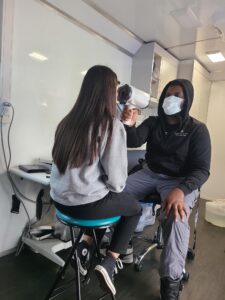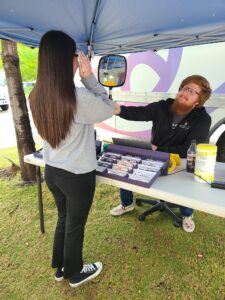SPH students bring eye care clinics to campus
 During The University of North Texas Health Science Center’s celebration of Public Health Week in April, student organizers from the university’s School of Public Health wanted to offer free eye exams and glasses to anyone in need.
During The University of North Texas Health Science Center’s celebration of Public Health Week in April, student organizers from the university’s School of Public Health wanted to offer free eye exams and glasses to anyone in need.
The organizers reached out to the OneSight Essilorluxottica Foundation, an international nonprofit committed to improving lives through better vision with access to free eye exams, free glasses and funding for vision care programs. The France-based organization partnered with HSC to host two free eye care clinics.
Faculty, staff, students and family members took advantage of the opportunity, as eye care providers scheduled 120 appointments, gave out 72 pairs of glasses and provided more than $20,000 in services on campus.
“Collaboration is at the heart of what makes HSC so great,” said Dr. Charles Taylor, HSC provost and executive vice president for academic affairs. “I am so proud of our students and the School of Public Health team for leading this initiative and the partnership with our friends at the OneSight Essilor Luxottica Foundation. The impact on people’s lives and the community that outreach efforts like this provide is at the core of our values.”
The ability to see deeply affects how people perceive and interpret the world around them. For most individuals, eyesight is part of everyday communication, social activities, educational and professional pursuits, the care of others, and the maintenance of personal health, independence and mobility.
The collaboration with the OneSight Essilorluxottica Foundation, which seeks out communities most in need, aligns with HSC’s focus on whole health.
“Partnering with OneSight Essilor Luxottica Foundation during Public Health Week to provide much-needed eye care for our communities highlights the critical role of public health in helping to address vision impairment and the conditions, diseases and injuries that cause vision loss,” said Shafik Dharamsi, dean of HSC’s School of Public Health.
According to data from The World Health Organization, at least 2.2 billion people globally have near or distance vision impairment. In at least 1 billion – or almost half – of these cases, vision impairment could have been prevented or has yet to be addressed.
Young children with early onset severe vision impairment can experience delayed motor, language, emotional, social and cognitive development, with lifelong consequences. School-age children with vision impairment can also experience lower levels of educational achievement.
Vision impairment severely impacts quality of life among adult populations. Adults with vision impairment often have lower rates of workforce participation and productivity and higher rates of depression and anxiety. Functioning eyes and vision system can reduce an adult’s risk of chronic health conditions, death, falls and injuries.






Social media